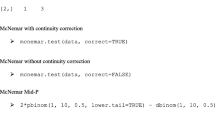Abstract
Arising from M. A. Nowak, C. E. Tarnita & E. O. Wilson Nature 466, 1057–1062 (2010)10.1038/nature09205; Nowak et al. reply
Arguably the defining characteristic of the scientific process is its capacity for self-criticism and correction1. Nowak et al.2 challenge proposed connections between relatedness and the evolution of eusociality3, suggest instead that defensible nests and “spring-loaded” traits are key, and present alternative modelling approaches. They then dismiss the utility of Hamilton’s insight that relatedness has a profound evolutionary effect3, formalized in his widely accepted inclusive fitness theory as Hamilton’s rule (“Rise and fall of inclusive fitness theory”). However, we believe that Nowak et al.2 fail to make their case for logical, theoretical and empirical reasons.
Similar content being viewed by others
References
Mayr, E. The Growth of Biological Thought (Harvard Univ. Press, 1982)
Nowak, M. A., Tarnita, C. E. & Wilson, E. O. The evolution of eusociality. Nature 466, 1057–1062 (2010)
Hamilton, W. D. Narrow Roads of Gene Land. Vol. I. Evolution of Social Behaviour (Oxford Univ. Press, 1998)
Hughes, W. O. H., Oldroyd, B. P., Beekman, M. & Ratnieks, F. L. W. Ancestral monogamy shows kin selection is key to the evolution of eusociality. Science 320, 1213–1216 (2008)
Cornwallis, C. K., West, S. A., Davis, K. E. & Griffin, A. S. Promiscuity and the evolution to complex societies. Nature 466, 969–972 (2010)
Boomsma, J. J. Lifetime monogamy and the evolution of eusociality. Phil. Trans. R. Soc. B 364, 3191–3207 (2009)
Costa, J. T. The Other Insect Societies (Harvard Univ. Press, 2006)
Michener, C. D. The Social Behavior of the Bees (Harvard Univ. Press, 1974)
Michener, C. D. From solitary to eusocial: Need there be a series of intervening species? Fortschr. Zool. 31, 293–306 (1985)
Jeanson, R., Kukuk, P. F. & Fewell, J. H. Emergence of division of labour in halictine bees: Contributions of social interactions and behavioural variance. Anim. Behav. 70, 1183–1193 (2005)
Wcislo, W. T. Social interactions and behavioral context in a largely solitary bee, Lasioglossum (Dialictus) figueresi (Hymenoptera, Halictidae). Insectes Soc. 44, 199–208 (1997)
Cronin, A. L. A molecular phylogeny and social behaviour of Japenese Ceratina (Hymenoptera, Apidae, Xylocopinae). Insect Syst. Evol. 35, 137–146 (2004)
Gardner, A., West, S. A. & Barton, N. H. The relation between multilocus population genetics and social evolution theory. Am. Nat. 169, 207–226 (2007)
Ratnieks, F. L. W. & Vissher, P. K. Worker policing in honeybees. Nature 342, 796–797 (1989)
Mueller, U. G. Haplodiploidy and the evolution of facultative sex ratios in a primitively eusocial bee. Science 254, 442–444 (1991)
Author information
Authors and Affiliations
Contributions
Both authors contributed extensively to all aspects of this work.
Corresponding author
Ethics declarations
Competing interests
Competing financial interests: declared none.
Rights and permissions
About this article
Cite this article
Herre, E., Wcislo, W. In defence of inclusive fitness theory. Nature 471, E8–E9 (2011). https://doi.org/10.1038/nature09835
Received:
Accepted:
Published:
Issue Date:
DOI: https://doi.org/10.1038/nature09835
- Springer Nature Limited
This article is cited by
-
Extended parental care in the mass provisioning silk wasp, Microstigmus rosae
Behavioral Ecology and Sociobiology (2024)
-
Ordinaries 13: apparent spite & apparent altruism
Journal of Bioeconomics (2023)
-
Nine Levels of Explanation
Human Nature (2021)
-
The evolution of simultaneous progressive provisioning revisited: extending the model to overlapping generations
Behavioral Ecology and Sociobiology (2017)
-
Impact of Roles Assignation on Heterogeneous Populations in Evolutionary Dictator Game
Scientific Reports (2014)





